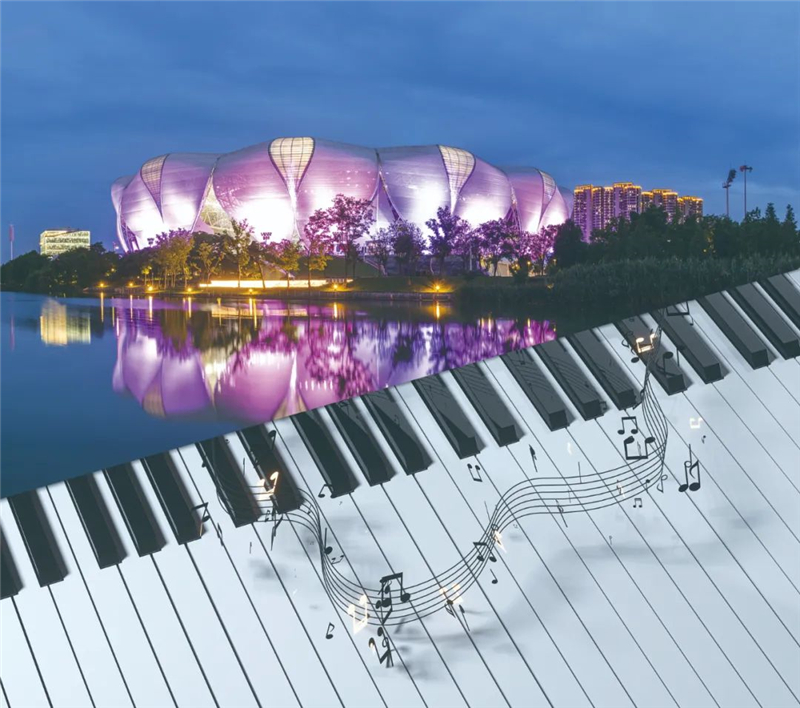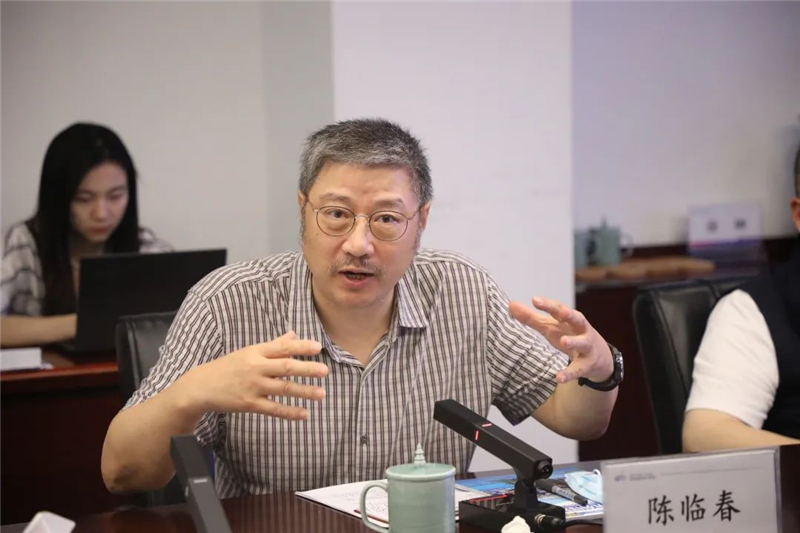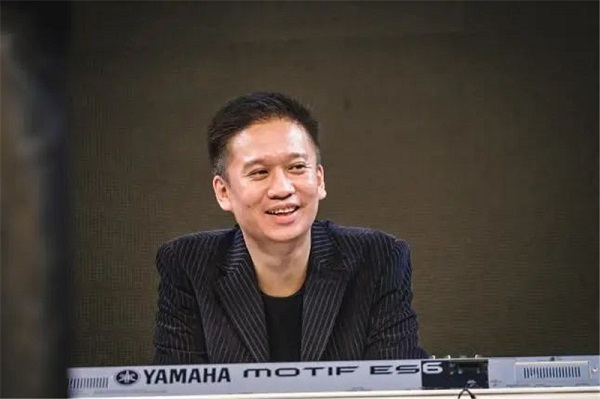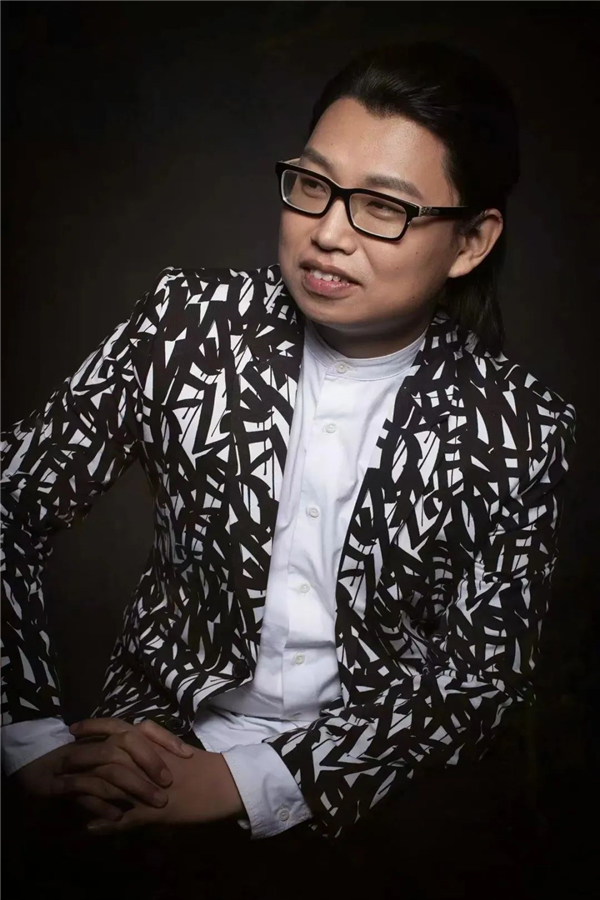
"Please compose the theme song for the 19th Hangzhou Asian Games!" A sonorous and powerful invitation resounded across the screens, conveying the enthusiastic expectations of the people working for the Hangzhou Asian Games for a popular theme song that can be sung for a long time.
We were surprised to find that the third round of the theme song collection for the Asian Games once again received wide attention and active participation from the community. It was high time to transmit the tempo of the times and sing the good voice of the Asian Games. In this issue Hangzhou Asian Games, we have interviewed famous songwriters, new songwriters, and mass dreamers, to record their musical relations and dreamy journey in the process of collecting the "Asian Games theme song".
Convey the meaning of reunion and fraternity

Chen Linchun: former deputy director of the CCTV Large Program Centerre and chief director of three Spring Festival Galas
As a member of the expert jury of the Hangzhou Asian Games theme song, the local director born in Hangzhou came from the stage of the Spring Festival Gala, with a nostalgia for his home city and longing for the upcoming Asian Games in Hangzhou.
"The upcoming Asian Games is not only a sporting event, but also carries the expectations of all the Asian people for this grand international event. In the theme song, it is important to convey a sense of reunion and fraternity, as we have survived the pandemic," Chen Linchun said.
What kind of theme song should the Hangzhou Asian Games have? In the eyes of Chen, the theme song should disregard the previous models that talk about "love" and "peace" in general, and more importantly, it should be a release and catharsis of the common feelings of people in a special period, and become a tribute to the unrestrained life after overcoming the difficulties of the pandemic.
At the 1990 Beijing Asian Games, the theme song The Same Song was sung at the Beijing Workers' Stadium, carrying the expectations of people at that time for the first large-scale international sporting event to be held in China. Chen was also directly responsible for organising the creation of the lyrics and music of this song. He believed that a successful theme song should be popular. On the one hand, it should be consistent with the grand thematic scene; on the other, it should be "simple and pleasant to listen to", and it should have the effect of being catchy. Therefore, let's get rid of the shackles of mediocrity, and refine the annual background of the Hangzhou Asian Games into words that inspire life, so as to stimulate the composer to burst out a beautiful rhythm, and a good song may be born.
"Let's imagine a picture: tens of thousands of people forming a big circle around the West Lake hand in hand, singing a song with simple lyrics and a catchy melody together. Then, this song is the theme song we want." This is the song in Chen's mind.
This will be a "dynamic and loving" composition

Kang Zhuqing: Music composer,music producer
As a senior music producer, Kang Zhuqing created theme songs for the opening and closing ceremonies of the East Asian Games and the IAAF World Junior Championships. The Asian Games is not only a new thematic attempt for her, but also carries different emotions. She hopes to show the highlight of Hangzhou to the world through music.
The song is still in the writing lyrics stage. The music will be composed on the basis of the words. Kang Zhuqing hopes that the song will highlight a youthful and positive attitude.
She believes that the style of a big country should have multiple interpretations. The Hangzhou Asian Games is set against the background of the modernization drive, and China is also in a vigorous and inclusive stage of development. "The historical sediment of an ancient civilization is in the blood of the musician. It is the cultural confidence of a theme song to show our spirit to the world."
Like Tukoh Taka of the Qatar World Cup, it is of aesthetic significance to communicate to the world in a magical but trendy language. This is exactly what Kang Zhuqing wanted to say, "Music can't be composed in a stroke, as the composers should understand the cultural background and ethnic charm behind the songs."
Returning to the topic of the theme song, "I want to convey something that is both rhythmic and passionate. This feeling allows you to grasp the deepest and softest level of your heart in a relaxed situation."
She is looking forward to a song to which "people want to cheer, laugh and dance. It doesn't need too many efforts, but it is definitely not a sinking spiritual world".
It is Kang Zhuqing's wish to use her music to convey the all-embracing spirit, which can be passed down for a long time in future Games.
Integrate national features into the world character

Peng Cheng: national first-class composer, music producer

Gan Shijia: lyricist
Gan Shijia and Peng Cheng felt honored and proud to be able to co-author a theme song for the Hangzhou Asian Games. With the intimacy of "having hiked in every mountain in Hangzhou", the two "Hangzhou hands" from Shanghai are looking forward to expressing their love for Hangzhou in their Asian Games songs.
The root of the Asian Games theme song lies in the beautiful and rich land of Hangzhou. In Gan Shijia's view, Hangzhou had the reputation of being the most beautiful city in Asia in ancient times, for the beauty of its lakes and mountains, its depth of history, and its openness and inclusiveness to the world. It's a city leading the trend. How to integrate these aspects is the direction that the co-authors want to try.
"The general tendency of the theme songs of international games is to integrate national features into the world character." Gan Shijia said that the theme song of large-scale games tends to be simple. The condensed form of the theme song is "Greatness in Simplicity", like You and Me sung in the Beijing Bird's Nest, so that the world can feel the beauty of the perfect harmony of civilizations.
With Peng Cheng's partnership, the song has been discussed many times in the early stages, including its basic structure, style and orientation. In Peng Cheng's mind, the theme song should have its own characteristics. Therefore, in its music style they will try to translate it into a language that can be understood by the whole world from the perspective of intangible cultural heritage, represented by national features.
"I want to dig something out of our great intangible cultural heritage and integrate it into our works." Peng Cheng mentioned that the song will start from local folk songs, with characteristics of the southern region of the Yangtze River, and they draw inspiration from the local folklores and historical documents; In addition, they also want to tap local operas, such as Shaoxing Opera, which is known as "the second national opera", to extract the moving melody from it and polish an "international song with strong regional colour and ethnic flavour".
On the way to artistic creation, we need to make continuous breakthroughs. While the song is getting widely accepted, it is endowed with cultural self-confidence and oriental charm. They expect to "show the confident and beautiful side of the Hangzhou culture with their music ".
Passionately we participate to convey a special feeling for the Asian Games
In the eyes of many music lovers, joining in the wave of contributions with the theme songs is a boost to the Hangzhou Asian Games and a stroke of life in pursuit of a dream stage.
As the contributor of the song Jinzhao(Today), Mao Xinyi is a graduate student at Hangzhou Normal University's School of Music. She loves sports and hopes to convey the enthusiasm of young students about participating in the Asian Games through her music.
Jinzhao(Today) is an attempt to integrate Hangzhou's unique Jiangnan scenery with its intangible cultural heritage (canal work songs, cuju football), and sparks inspiration from the torch's fire. While showing the charm and hospitality of the host city, it also shows how ancient Chinese sports are passed down to today and the endless growth of an Asian Games culture.
"Integrity, innovation, and making the past serve the present are the characteristics of the song. I want to reflect the heroic sense of 'looking for heroes in the present time'." Mao Xinyi made an introduction to her "chasing today's dream". At present, the song sample recording has been completed. Later, we will focus on deepening and polishing the arrangement, singing style and music production, highlighting the blend of ancient rhyme and modern sense.
Wang Siying wrote the excellent music Victory for the Beijing Winter Olympics. This time, he chose to continue by writing the theme song for the Asian Games, which is another breakthrough in the state of "flow of heart".
The song is currently wanting a melody line. The lyrics are an attempt to be close to the theme words of the Asian Games, such as "Heart to Heart, @ Future". The arrangement is in a national pop style. The fusion method is adopted to achieve the balance between national and international styles.
"First of all, we should reflect the style of the Jiangnan water town Hangzhou. The arrangement will integrate some folk musical instruments. On the basis of popular music, we will try our best to return the song to a natural style." Wang Siying pointed out that, just like the "blank saving" technique in Chinese art, we hope that the works can bring more space for imagination and show the infinite possibilities of China and Hangzhou in the future development.
Wang Siying also tries to create a song about sportsmanship for the Asian Games. Both songs are planned to be made into an MV. She said, "I hope to express my support and passion for the Hangzhou Asian Games through music and cheer for the athletes."
Huang Shan is a chemistry competition coach at Hangzhou Xuejun Middle School and a contributor of the song Back to the West Lake.
This song was born in a water room of Peking University. On the night of Qingming Festival in 2014, homesickness touched the creative thoughts of this young student. Central to the lyrics is the cultural landscape familiar to the people of Hangzhou, as well as the dense fog in the south of the Yangtze River. "I hope that through this song, people all over Asia and the world can understand Hangzhou and start to like it." As a Hangzhou native, Huang Shan submitted a draft to HAGOC very early to show his support for the Asian Games held in his hometown.
From winning a gold medal at the National Chemistry Olympiad to the coach of two world champions, Huang Shan was connected with the Olympics early in his life. This time, he participated in the Asian Games with his music. "The Olympic spirit comes down in a continuous line. Breakthroughs either mentally or physically are essentially the pursuit of the faster, higher and stronger competitive spirit."
From some "Olympics" to some other "Olympics", Huang Shan hopes that more music works will emerge for the Asian Games, giving the world a reason to listen to and fall in love with Hangzhou.